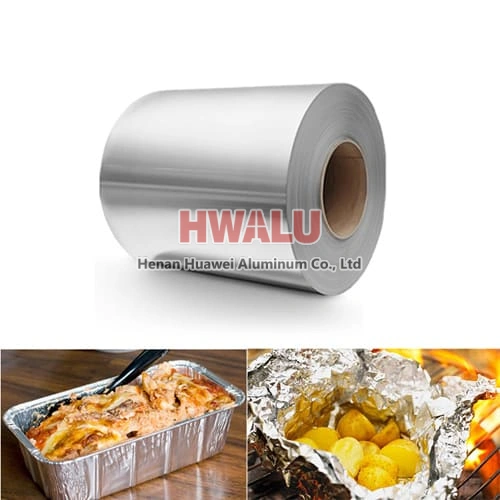What is the aluminum foil of the burner cover? The aluminum foil cover for the burner head is aluminum foil cover used to protect the burner head. A burner refers to a flame nozzle used on a gas stove, gas stove, or other gas appliances, which is used to mix gas and air and ignite it to produce a flame. During long-term use, grease and dust may accumulate on the surface of the burner, which may affect the qua ...
What Is Food Packaging Aluminium Foil Roll 8011 As we all know, aluminum foil is widely used in our daily life, especially in the field of food packaging. Aluminum foil roll 8011 is a common food packaging material. 8011 aluminum alloy is a high-quality aluminum alloy with good ductility, strength and corrosion resistance. This type of aluminum foil is commonly used for food packaging. 8011 aluminum fo ...
Aluminum foil for packaging bag introduction Aluminum foil bags are also called aluminum foil bags or aluminum foil packaging bags. Because aluminum foil has excellent barrier properties and protective capabilities, it is widely used to package a variety of products. These foil bags are commonly used to preserve the freshness, flavor and quality of food, pharmaceuticals, chemicals and other sensitive items. ...
Aluminum foil for kitchen parameters Surface Teatment: One side bright, another side dull. Printing: coloured gold, rose gold Embossed: 3d pattern Thickness: 20mts, 10 mic, 15 micron etc Sizes: 1m, 40*600cm, 40x100 cm etc Characteristics and uses of kitchen aluminum foil Aluminum foil is a versatile and commonly used kitchen item that offers a range of benefits for cooking, food storage and othe ...
What is house hold aluminium foil? Household Aluminium Foil ( HHF ) has many special characteristics: rich polish, lightweight, anti-damp, anti-pollute and is the well transmit electricity body. It has been used vastly in the shield layer of the food vessel, electron, material equipment, and communication cable. We can supply aluminum foil thickness from 0.0053-0.2mm, and width from 300-1400mm. Alloy includes 80 ...
It is generally believed that the single-sheet rolling speed of the aluminum foil should reach 80% of the rolling design speed of the rolling mill. Danyang Aluminum Company introduced a 1500 mm four-high irreversible aluminum foil roughing mill from Germany ACIIENACH. The design speed is 2 000 m/min. At present, the single-sheet aluminum foil rolling speed is basically at the level of 600m/miT, and the domestic s ...
In the production process of aluminum foil, there are multiple processes such as rolling, finishing, annealing, packaging, etc. The interlocking production process, any problem in any link may cause aluminum foil quality problems. The quality defects of the purchased aluminum foil products will not only affect the appearance, but also directly affect the quality of the products produced, and even more directly ca ...
Aluminum foil lunch box is a new type of non-toxic and environmentally friendly tableware. 1. The main ingredient in the aluminum foil lunch box is aluminum, so it will react with acid like aluminum cans, and the salt produced by aluminum and organic acids will react with gastric acid to produce aluminum chloride, so we need to use it. Note that, generally speaking, it is often used for steaming rice. There is ...
Aluminum foil has good moisture-proof properties. Although pinholes will inevitably appear when the thickness of the aluminum foil is less than 0.025mm, when observed against light, the moisture-proof properties of aluminum foil with pinholes are much stronger than those of plastic films without pinholes. This is because the polymer chains of plastics are widely spaced apart from each other and cannot prevent wat ...
hot ingot rolling First, the aluminum melt is cast into a slab, and after homogenization, hot rolling, cold rolling, intermediate annealing and other processes, it is continued to be cold rolled into a sheet with a thickness of about 0.4~1.0 mm as a foil blank (casting → hot rolling billet → cold rolling → foil rolling). In the ingot hot rolling method, the hot rolled billet is first milled to remove defect ...
Foil bags are not toxic. The inside of the aluminum foil insulation bag is a soft insulation material such as foam, which meets the food safety regulations. Aluminum foil has excellent barrier properties, good moisture resistance, and thermal insulation. Even if the heat reaches the middle PE airbag layer through the inner aluminum foil layer, heat convection will be formed in the middle layer, and it is not easy ...







